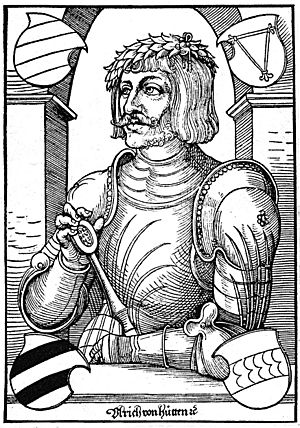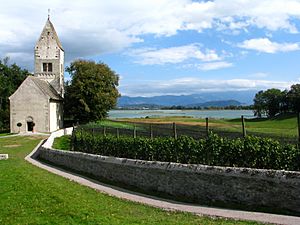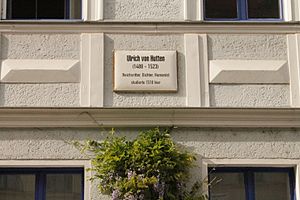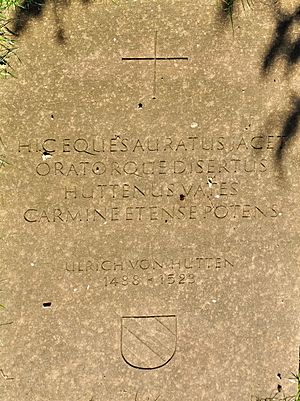Ulrich von Hutten facts for kids
Quick facts for kids
Ulrich von Hutten
|
|
|---|---|

Ulrich von Hutten, c. 1522
|
|
| Born | 21 April 1488 Burg Steckelberg, near Schlüchtern, Hesse |
| Died | 29 August 1523 (aged 35) Ufenau on Lake Zurich |
| Occupation | Monk, knight, writer |
| Education | Theology |
| Alma mater | University of Greifswald |
| Period | Reformation |
| Literary movement | Reformation, Renaissance humanism, German Renaissance |
| Notable works | Epistolae obscurorum virorum De Morbo Gallico Ars versificandi Nemo |
| Signature | |
Ulrich von Hutten (born April 21, 1488 – died August 29, 1523) was a German knight, writer, and poet. He was known for his sharp and funny writings, called satires. Later in his life, he became a supporter of Martin Luther and the Protestant Reformation, a big change in the Christian church.
By 1519, Ulrich von Hutten was openly criticizing the Roman Catholic Church. He helped connect the ideas of the Renaissance humanists (scholars who focused on human values) with the changes brought by the Reformation. He was also a leader of the Imperial Knights, a group of noble warriors in the Holy Roman Empire. Along with Franz von Sickingen, he led the Knights' Revolt.
Contents
Who Was Ulrich von Hutten?
Ulrich von Hutten's life can be split into four main parts. First, his childhood and time in a monastery (1488–1504). Second, his travels to gain knowledge (1504–1515). Third, his conflict with Ulrich of Württemberg (1515–1519). Finally, his involvement with the Reformation (1510–1523).
Early Life and Education
Ulrich von Hutten was born in Steckelberg Castle, near Schlüchtern, Hesse. He was the oldest son in a knightly family that was not rich but still respected. Because he was small and often sick, his father decided he should become a monk.
When he was ten, his father sent him to a Benedictine monastery in Fulda. The school there was very good, and he received an excellent education. However, he did not like the strict life of a monk. In 1505, he ran away to Cologne. This gave him freedom, but it made his father very angry.
A Life of Learning and Travel
In Cologne, Hutten met important scholars and poets. In 1506, he went to Erfurt. Soon after, he joined his friend Johannes Rhagius in Frankfurt an der Oder. A new university was opening there. He earned his master's degree and published his first poem.
In 1507, he followed Rhagius to Leipzig. He faced many challenges during his travels. One report says he was shipwrecked and became a beggar. Another says he got very sick but recovered.
In 1509, he studied theology at the University of Greifswald. He was welcomed at first. But he was proud and often reminded people of his noble background. His friends there grew tired of him. Hutten left Greifswald, and his clothes and books were stolen by his former friends' servants. In the cold winter, hungry and without money, he reached Rostock.
In Rostock, other humanists welcomed him. He wrote against his Greifswald friends, starting his long history of fierce attacks on his enemies. He soon moved on to Wittenberg. In 1511, he published his book Ars Versificatoria, which was about writing poetry.
He then went to Leipzig and later to Vienna. He hoped to impress Emperor Maximilian with a poem about the war with Venice. But neither the emperor nor the University of Vienna helped him.
So, Hutten traveled to Italy and settled in Pavia to study law. In 1512, war interrupted his studies. During a siege of Pavia, he was robbed by both sides. He escaped, sick and poor, to Bologna. After he recovered, he served briefly as a soldier in the emperor's army. By 1514, he was back in Germany.
Thanks to his poetry and the help of a friend, Eitelwolf von Stein, he gained the favor of Archbishop Albert of Brandenburg, the elector of Mainz. Hutten dreamed of making Mainz a center for great humanist learning and writing.
Fighting for Justice
In 1515, a sad event changed Hutten's life. His relative, Hans von Hutten, was killed by Ulrich, duke of Württemberg. Satire, a way for the less powerful to fight back, became Hutten's main weapon. He helped write the famous Epistolæ Obscurorum Virorum (The Letters of Obscure Men). He also wrote strong letters and sharp satires against the duke. These writings made him famous across Germany.
Epistolæ Obscurorum Virorum supported Hutten's teacher, Johannes Reuchlin. Reuchlin was trying to stop people from taking away Hebrew books. The Epistolæ were fake letters that made fun of the scholars who were against Reuchlin.
Hutten went back to Italy to get his law degree. He returned to Germany in 1517. The emperor protected him and gave him the titles of poet laureate and knight. However, the emperor also protected Duke Ulrich of Württemberg. While in Italy, Hutten grew to strongly dislike the Pope and the Church leaders. He attacked them in a book he published in 1517. This helped prepare the way for Martin Luther.
In 1518, Hutten traveled with Archbishop Albert to Paris and to the Diet of Augsburg. This was where Luther had an important meeting with Thomas Cajetan. Later, Hutten set up a small printing press. He published many small books, called pamphlets, in German. These pamphlets attacked the Pope and the Roman clergy.
Joining the Reformation

Archbishop Albrecht von Brandenburg reported Hutten to Rome. Because of this, in 1519, Hutten became a strong supporter of Luther and his ideas for religious change. But unlike Luther, Hutten wanted to use military force to bring about the Reformation. He and Franz von Sickingen tried to start a popular fight within the Holy Roman Empire. They wanted to reduce the power of the Roman Catholic Church and support Luther's new religion.
This conflict became known as the Knights' Revolt. In 1522, they attacked the lands of the Archbishop of Trier. However, the archbishop defended his lands successfully. The knights were defeated in 1523. This defeat ended their power in the empire.
After his defeat, Hutten tried to convince Erasmus of Rotterdam, another famous scholar, to join the Reformation. Erasmus refused to take sides. He also refused to meet Hutten when Hutten came to Basel in 1523. Hutten was sick and poor at the time. Their disagreement led to a public argument between the two scholars. Hutten's book, Ulrichi ab Hutten cum Erasmo Rotirodamo, Presbytero, Theologo, Expostulatio, collected his arguments against Erasmus. It was printed in 1523.
Ulrich von Hutten died alone on the island of Ufenau on Lake Zurich.
Important Writings
Hutten was very open about his beliefs, more so than most people of his time. He played a big role in preparing for and promoting the Reformation. He was excellent at writing in Latin and was skilled at writing sharp, passionate attacks. His writing career is usually divided into three periods:
- Latin poems (1509–1516)
- Letters and speeches (1515–1517)
- Dialogues and letters in Latin and German (1517–1523)
In total, he published about 45 different works.
His most important works include:
- Ars versificandi (The Art of Poetry Writing, 1511)
- Nemo (1518)
- A book about the Morbus Gallicus (a disease, 1519)
- The collection of complaints against Duke Ulrich (1519), which included his four Ciceronian Orations, his Letters, and the Phalarismus
- The Vadismus (1520)
He also wrote many poems in both Latin and German.
Letters of Obscure Men
His most famous contribution to literature was his part in the Epistolæ Obscurorum Virorum (Letters of Obscure Men). At first, some monks thought the book supported them, not understanding its humor and irony. But soon, learned people realized it was a satire, and the book became very popular. The first part came out in late 1515. The second part appeared in 1517.
It was debated for a long time how much Hutten wrote of this famous work. While Hutten himself denied writing the whole book, he definitely contributed to it. Scholars now believe that the first part was mostly written by Crotus Rubianus, except for the first letter, which was by Hutten. The second part and its additions were mostly by Hutten, with some help from others.
Life as a Knight
Hutten wrote a vivid description of how hard life was for a vassal knight in medieval Europe. A vassal knight was a noble warrior who served a lord. In a letter to Willibald Pirckheimer, Hutten showed that the life of the nobility was not always as glamorous as it seemed.
Family Connections
Besides Hans von Hutten, Ulrich von Hutten was also related to Philipp von Hutten, a German adventurer.
Images for kids
See also
 In Spanish: Ulrich von Hutten para niños
In Spanish: Ulrich von Hutten para niños
 | Precious Adams |
 | Lauren Anderson |
 | Janet Collins |




